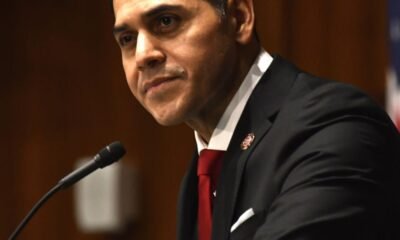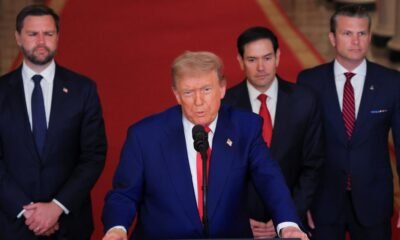arizona
LGBTQ+ Activists in Arizona Gear Up for Challenges Under Far-Right Rule

Claudia Kline has been actively involved in community advocacy, engaging in voter registration drives and educating neighbors about ballot measures. Using they/them pronouns, Kline has been dedicated to these efforts even before they were able to vote. As the electoral campaign manager for Our Voice Our Vote, Kline represents a growing wave of queer Arizonans mobilizing in response to a shifting political landscape.
This election cycle has been particularly intense, especially with a GOP-led local government that is perceived as embracing authoritarian practices. The party’s endorsement of Trump as a central figure has raised concerns about potential policies that may restrict trans rights and undermine equal access to housing and legal protections. Given these developments, Kline and others are contemplating their next courses of action.
“Elections have never been a finish line,” Kline remarked. “They’re a check-in with your community… There’s always work to be done and people who need to be held accountable.” Their sentiments reflect a broader movement among activists to prepare for future challenges, particularly in light of Trump’s recent electoral victory over Vice President Kamala Harris.
Organizers have taken to online platforms advocating for community solidarity against far-right agendas. However, the path forward remains unclear. Sena Mohammed, executive director of Our Voice Our Vote, believes that a shift in narrative is crucial. “I don’t want our narrative to be about blaming each other and pointing fingers,” she stated, emphasizing the need for genuine outreach and relationship-building.
Organizations such as Rural Arizona Action are committed to enhancing community engagement, regardless of the challenges. Sue Doerfer, the campaign’s statewide director, noted the importance of listening to marginalized voices. “We truly believe that 99 percent of people don’t want others to be harmed,” she said, underlining the necessity of open conversations about the impacts of political decisions.
In parallel, groups like Trans Queer Pueblo focus on providing essential support to vulnerable communities, many of whom cannot vote. “Seventy-five to 80% of our members can’t vote, so it’s a system that has already excluded us,” remarked Sonix Flores, the organization’s media coordinator. With propositions like Prop 314 potentially criminalizing unlawful entry into Arizona, fears of racial profiling and discrimination loom large.
Legal professionals are bracing for the implications of such measures. Francisco X. Aguirre, a paralegal, highlighted the importance of preparedness: “Most people were really caught by surprise by SB1070. It might be difficult to think something like that could happen again, but it really might.” Educating immigrant and mixed-status families about their legal options is now a priority for advocates.
José Patiño of Aliento urged community members to advocate for humane policies, reminding them to hold elected officials accountable. “People need space to be heard,” he said, acknowledging the difficult choices facing youth, especially those with DACA status.
Despite pervasive anxiety, many organizers express hope for the future. Mohammed pointed out the small victories that can energize civic engagement. “There were some small wins. Prop 139 was overwhelmingly approved, and that’s something that doesn’t rely on a candidate, which feels really good as a woman.” This measure enshrines the right to an abortion within Arizona law, serving as a testament to grassroots organizing.
Kline reiterated the importance of celebrating small achievements, pointing to newly elected members in local districts. “We need to change the narrative of this being a waste of time to these conversations being investments in our future,” they emphasized.
As organizing efforts continue, Doerfer reminded everyone of the enduring struggle for rights. “I came out [as gay] in 1978… We are in this for the long haul, and every day that goes by, we make a little movement. I don’t personally think Trump can stop it. We are too strong and too motivated.”


















